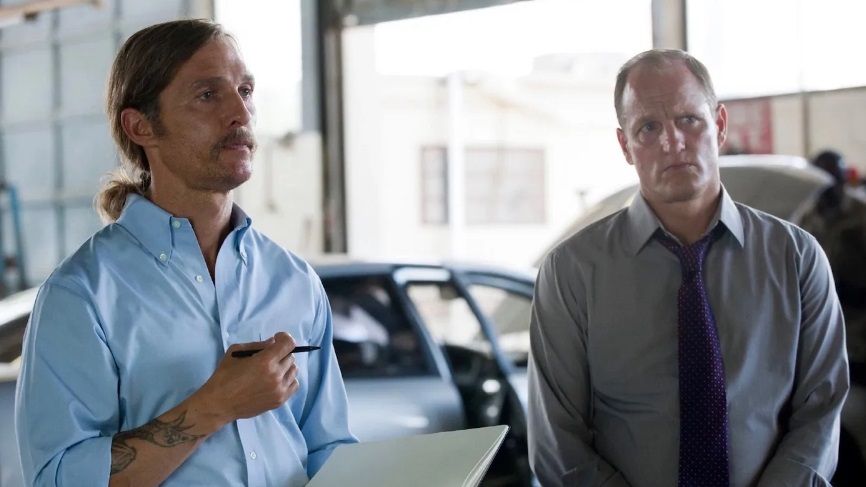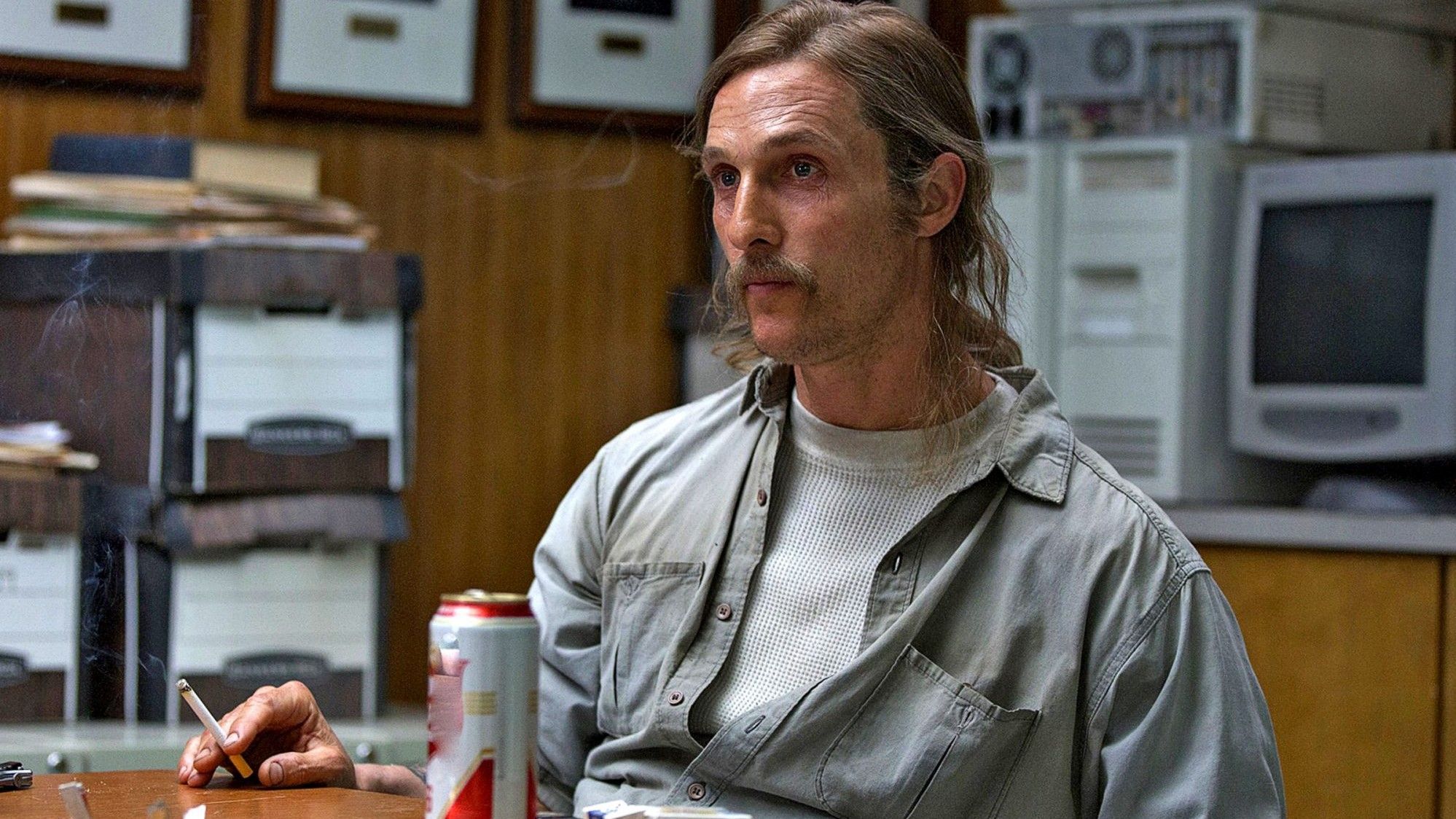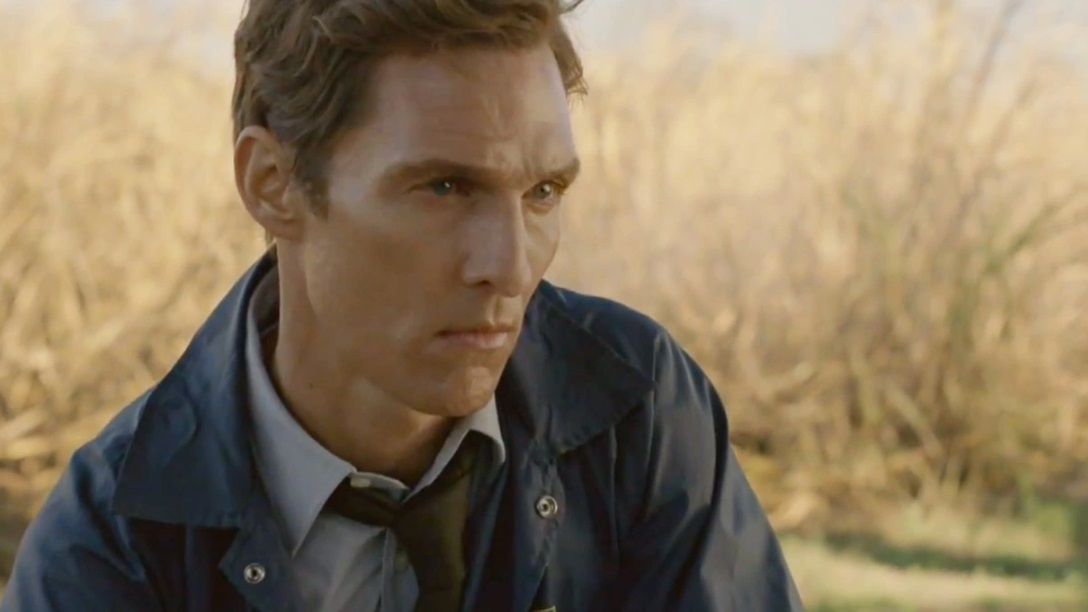“Time is a flat circle.” Five words that call to mind a vivid shared cultural memory. Season 1 of True Detective. Matthew McConaughey, playing Rust Cohle, a former homicide detective turned alcoholic, now bleary-eyed with paranoia and despair. Colors pop immediately onto your mental TV screen. The wood paneling of the interrogation room, where Cohle reopens the old wounds from his one unfinished case. The red and white of the Lone Star beer cans he’s sucking dry and shaping into visual aides. The sentence itself stands in for everything that fascinated us about this character. Not just the sense that Cohle has seen through to the center of reality and tragically survived, but the belief that no matter how strange it sounds, his description of the truths he’s seen is accurate, and we should try to understand him.
But do the words — time is a flat circle — mean anything? If so, what? And if not, does it matter?
Friedrich Nietzsche and Eternal Recurrence
The line is spoken in episode 5. The show is set in 2012, but is largely made up of flashbacks to the year 1995, when Cohle and his ex-partner, Marty Hart (Woody Harrelson), seemed to have solved the murder of Dora Lange. The man they thought was the killer, a drugged out, occultist meth cook named Reggie Ledoux, is the first person to say the words, after they’ve tracked him to his hideout in the Louisiana back country. “I know what happens next… you’ll do this again. Time is a flat circle.”
“What is that, Nietzsche?! Shut the fuck up,” says Cohle. Soon after that, Hart discovers two children being held prisoner on Ledoux’s property, and makes the snap decision to execute him. So, those turn out to be his last words.
Cohle is correct that Ledoux is paraphrasing Friedrich Nietzsche, the 19th century German philosopher, whose work Ledoux has clearly encountered. They come from Nietzsche’s book Thus Spoke Zarathustra, which is one of several places that he wrote about the concept of “eternal recurrence.” Eternal recurrence is the idea that, because time is endless, everything will eventually repeat itself, and therefore, your life will repeat an infinite number of times, exactly the same way each time.
Thus Spoke Zarathustra is actually a work of fiction, though it’s structured as a series of lectures delivered by Zarathustra, a sage who is usually presumed to be speaking what Nietzsche himself believed. Zarathustra is a bit like Rust Cohle; he’s prone to monologues, and he reacts to disappointment by disappearing for years at a time to be alone. And, as in True Detective, he first hears the words “time is a circle” from an antagonist, a rival hermit he scuffles with on a mountain plateau.
But, for Nietzsche, the idea of eternal recurrence was a cause for celebration. He saw it as the “highest of all possible formulae of a yea-saying philosophy.” The best reason you should be happy to exist, even if you’ve given up the belief in a spiritual afterlife. The idea is that eternal recurrence is great news, as long as you make your life into something you want to relive an infinite number of times.
A natural reaction to this might be that, OK, if eternal recurrence is real, let’s all make sure that our lives are joyful and pleasant, with plenty of pillows. Nietzsche was not about that. To him, eternal recurrence suggested that one should instead aspire to a higher state of being, and seek meaning through conflict and struggle. Zarathustra, lecturing the masses, lays out the choices explicitly: break through to a higher plane, or become “the last men,” who have given up on transcendence because they have “discovered happiness.” But they misunderstand him completely, and call back, “make us into these last men!” It’s one of many setbacks Zarathustra experiences.
For a more sophisticated and perhaps more accurate interpretation of the ideas of Nietzsche, you might want to start with Lawrence Hatab’s essay, “Time Is a Flat Circle: Nietzsche’s Concept of Eternal Recurrence,” which is available to read online.
“Time Is a Flat Circle” in Popular Use
If you do a quick search for “time is a flat circle” on Twitter, you’ll see that it’s an expression in daily rotation, as something you say when a recent event is similar to something that happened in the past. Not all that different from “history repeats itself” or even just “whoa, deja vu.”
Clearly, its meaning as an idiom has strayed far from the way Nietzsche meant it. But it’s not that far off from Rust Cohle’s intention. When he speaks the words, he’s sitting in an interrogation room in 2012, looking at pictures of a recent murder that looks just as horrific as the one he supposedly solved in 1995. “This is a world where nothing is solved,” he begins. The monologue begins as a regret that systemic problems never go away. But it segues quickly into a genuine consideration of eternal recurrence. “Someone once told me that ‘time is a flat circle.’ Everything we’ve ever done or will do, we’re gonna do over and over and over again.” To Cohle, eternal recurrence is a horrifying concept, because it means that the children who were victims of Reggie Ledoux will be forced to relive those events repeatedly, for eternity.
Does the idea of eternal recurrence really have all that much to do with the patterns of history and human behavior that we can observe as part of life? Maybe not too much, intellectually. But, there is clearly a poetic association there for series creator Nic Pizzolatto, and he gave that association to Cohle. And now, through a single line of dialogue, the two concepts are linked.
What Is M-Theory?
You may remember that Cohle illustrates the concept of a “flat circle” by dramatically crushing an empty can of beer. If you do, well, this memory is false. Cohle does hold up a smashed beer can as an example of what a circle looks like, but this moment comes in a later scene, when he’s explaining the concept of M-theory, or “M-brane theory” as he calls it.
M-theory comes out of theoretical physics. It’s the currently leading “theory of everything,” behind which there is much consensus, about the best way to describe the aspects of our physical reality that are not only well beyond our ability to observe, but are at the furthest frontier of what we are capable of comprehending. Many of these ideas are so out there, they can only be understood through abstractions. One of the precepts of m-theory is that, beyond the three physical dimensions that humans can perceive, and the one dimension of time, there are another seven space-time dimensions that we can’t experience, for a total of 11.
While the existence of 11 dimensions is supported by math (somehow) it can only be understood through analogy. One common way of helping people to imagine what a fourth physical dimension would be like is to ask them to imagine a being that lived in only a two-dimensional slice of our three-dimensional reality. If a sphere passed through their plane of existence, they’d perceive only a two-dimensional slice of it: a flat circle. Now, imagine a fourth-dimensional being perceiving us the same way. What we perceive as a sphere, is actually only a three-dimensional “slice” of a four-dimensional shape.
Cohle, because he is a higher-level being himself, empathizes with these theoretical 11-dimensional beings gazing down at us. He further imagines that time, which is a temporal dimension for us, could be a physical dimension to them, and that they could simultaneously perceive every moment that ever existed as plainly as we can see every floor of a building from the street. He reverses the usual way of expressing this difference in perspective by saying that reality, to us, is a sphere, “but to them, it’s a circle.” This dovetails back into eternal recurrence. If time, from some perspectives, is a physical dimension, then all moments are constantly occurring. It’s another way of saying that the past is more permanently alive than it seems.
Coincidentally, if you’d like to see further visualization of a four-dimensional sphere, or a structure where time is a physical dimension, there are few better places than Chistopher Nolan‘s Interstellar, also featuring McConaughey.
Arthur Schopenhauer and Antinatalism
Rounding things out is the other major overt philosophical influence on True Detective, Arthur Schopenhauer. As Cohle tells Hart when they’re first getting to know each other, “philosophically, I’m a pessimist.” He then delivers another iconic monologue about human consciousness as a tragic mistake in evolution, which mankind should correct by agreeing to stop having children, in order to voluntarily go extinct. Hart, a more typical Louisiana homicide detective, is scandalized by Cohle’s nihilism.
This monologue is widely understood to draw from the thinking of Arthur Schopenhauer (by way of the novelist Thomas Ligotti.) Schopenhauer, also considered a pessimist, believed that life is dominated by futile and insatiable desires that we helplessly obey. Like Cohle, he believed that it would be more dignified to ignore all of our impulses, including towards reproduction.
Something funny is that the people who are most knowledgeable about True Detective‘s philosophical influences (and, there’s a whole book on this subject) can be a bit oversensitive to the way it blends its sources. For example, Schopenhauer was a tremendous influence on Nietzsche, but the two had incompatible ideas. Neither believed in an afterlife, but Schopenhauer believed that death was followed by nothingness; Nietzsche didn’t believe in that escape. Nietzsche was life-affirming; Schopenhauer was life-negating. How can one person subscribe to both visions?
Of course, you can always find ways to work this out within the fictional reality of the show. Maybe Cohle is aware of Nietzsche, but is a true believer in Schopenhauer. Or, perhaps between 1995 and 2012, he changed his mind. These arguments have all been made, but the best explanation is that fiction has different rules than philosophy, and consistency is less important. Detective Rust Cohle is a theoretical construct, much like the 11th dimension. The canonical true detective, the ultimate badass. Too tough to ever be killed, too perceptive to misunderstand reality in any aspect. Such a character can only be expressed through analogy. They can’t simply agree that Schopenhauer had it right — that would make Schopenhauer the true detective. They have to be able to synthesize all of history’s greatest philosophers into one grand truth. It’ll never be expressed, the audience just has to understand that this hyper-comprehension is part of Cohle’s private thoughts, of which we’ll only get a glimpse. Fiction is full of superhuman characters like this. Cohle is just a uniquely convincing version of one.
True Detective returns for a fourth season in 2023. Its precise air date remains a mystery.
Stay connected with us on social media platform for instant update click here to join our Twitter, & Facebook
We are now on Telegram. Click here to join our channel (@TechiUpdate) and stay updated with the latest Technology headlines.
For all the latest TV News Click Here




